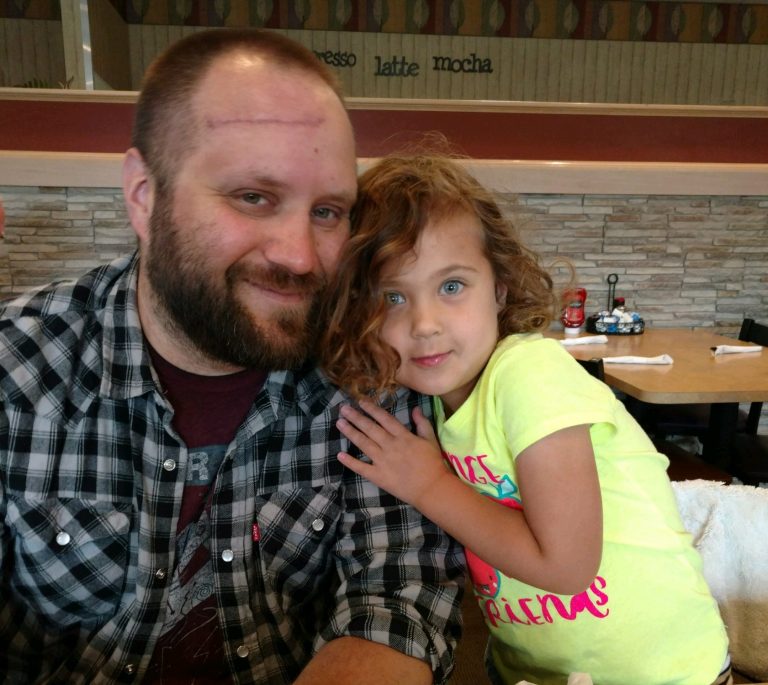It was 2010, and Stephen Christian was just 30 years old when he was diagnosed with a glioma – a mass on the left side of his brain. He was living in Oregon at the time and had scans every few months to check on the progression of the mass. The tumor didn’t seem to be growing and his doctors eventually told Stephen it wasn’t a tumor at all, but scar tissue from a previous car accident.
“It was a roller coaster for a few years,” Stephen said. In 2012, he and his wife, April, moved to Milwaukee where he saw a neuroscience team at Aurora St. Luke’s Medical Center. They firmly believed Stephen did in fact have a slow-growing tumor that they would monitor over time.
In 2013, Stephen and his wife had a baby girl, Eleanora, and he decided it was time to have the tumor removed. He gave his employer notice that he would need to take time off work for the surgery. But unfortunately, before he was able to get the surgery they let him go.
Now, with no job and no health insurance, Stephen was forced to put off his surgery a bit longer. He became a stay-at-home dad and was able to get on his wife’s insurance and have the surgery. In 2017, a team at Aurora St. Luke’s removed the original tumor, plus another that was found in his pituitary gland.
“I had a grand mal seizure during one of the surgeries. There were a handful of heavy physical and mental challenges after all that,” Stephen shared. He felt grateful that the tumors were gone, but now his chemotherapy and radiation journey would begin at Aurora Medical Center in Grafton. Stephen would realize his body and mind would never be the same.
How cancer changed him
“I used to be a certain type of person before cancer and I wasn’t sure who I was anymore,” Stephen explained.
The surgeries and treatments took a toll over time; it was like learning how to fly a plane when all you’ve ever done is drive a car. “I was a little depressed, processing why this happened and if I should be mourning the person I had been because it felt like a loss.”
“Patients have to grieve the life they had so they can create a new normal,” explained Justine Kopp, a family support specialist and registered art therapist who provides free counseling to cancer patients and their families at several Aurora Cancer Care clinics.
Before cancer, Stephen was pursuing his creative dreams of designing footwear. Now he was a stay-at-home dad relearning some basic tasks. But Justine tapped into his creative energy and started doing art therapy with him.
“Cancer totally uproots your life and your family’s life,” Justine said. “We give them permission to grieve and then try to maximize their resources and personal talents to heal.”
Justine helped Stephen channel what he was feeling onto canvases and then talk him through each piece. Why are the strokes so aggressive? Why did you use those colors? Why is this canvas so small? How do the brush strokes and color represent you? What is most important about the image? What title would you give the art? The answers to those questions helped Stephen put his emotions into words, which was therapeutic.
Finding your form of therapy
“Justine and art therapy enabled me to feel safe enough to be vulnerable and share what I was feeling,” Stephen said. “It helped me to be more honest with myself, and I was eventually able to work through some of those feelings on my own.”
Stephen finished his treatment and is now considered cancer free. Some of his artwork was put onto thank you cards and sent to Aurora Health Care Foundation donors in 2019.
“Offering these sessions for free to cancer patients was so helpful. I’m not sure if I would have done it otherwise, but it was really essential for my well-being” Stephen said.
Right now, Aurora Family Service provides two full-time and two part-time counselors to cancer patients and families for free counseling sessions. But more patients like Stephen need this support! You can make a gift or learn more about cancer care in your community.
